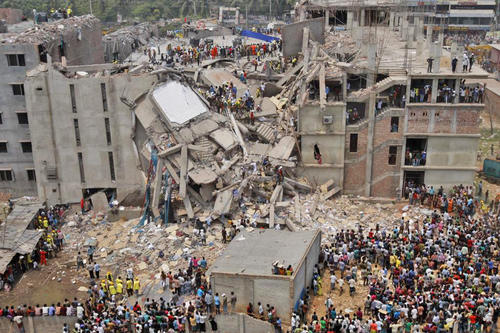A Thread of Hope
The Rana Plaza garment factory collapsed five years ago. An international study is investigating how working conditions in Bangladesh have changed since then.
Jul 24, 2018
A mass grave: 1,136 people lost their lives in the collapse of the Rana Plaza garment factory, in Bangladesh, and more than 2,500 were injured.
Image Credit: flickr-rijans
Rana Plaza was the most severe accident in the history of the textile industry. The nine-story factory located in the city of Savar, Bangladesh, collapsed on April 24, 2013. The disaster killed 1,136 people, and more than 2,500 were injured.
The collapse threw a spotlight on the high price that workers in low-wage countries pay for our clothing. Politicians and businesses made a lot of statements about their intentions afterward. But were these plans implemented? Can a disaster specifically lead to improved working and production conditions?
These questions are being addressed in a study entitled “Changes in the Governance of Garment Global Production Networks: Lead Firm, Supplier and Institutional Responses to the Rana Plaza Disaster,” which business scholar Elke Schüssler has been coordinating since 2015.
To reflect the complexity of the value chains that exist in the garment industry, Freie Universität works together with partners in five countries. They study all of the links in the value chain – from the Western client to the managers of the garment factories and all the way to the individual seamstress in Bangladesh – using quantitative and qualitative research methods drawn from the fields of sociology, political science, economics, and development and gender studies.
This study, which is financed by the Volkswagen Foundation, is due to run until the end of this year. Schüssler and her research associate Nora Lohmeyer, of the Department of Management at Freie Universität, can already report on results, however. The two scholars have studied various things, including the stance taken by German companies on changes in production conditions.
This includes aspects like whether they have joined the German Partnership for Sustainable Textiles (Bündnis für nachhaltige Textilien) and how the company’s internal corporate social responsibility (CSR) departments take action. “Events like Rana Plaza create public pressure, which can give companies’ often marginalized CSR departments much more of a voice,” Lohmeyer says, summing up one of the results of interviews conducted with 20 German apparel retailers and brands.
Some Improvement, But Far from Enough
Since then, the industry has taken action: Most of the companies have taken steps such as joining the German Textiles Partnership, but often without distinguishing themselves for any particular initiative of their own. Still, initiatives such as the Textiles Partnership are important, the scholars say. They promote dialogue and cooperation among competing companies, which is essential when it comes to lifting standards.
Schüssler explains that at the start, the initiatives focused on improving occupational safety and fire standards, including in association with the international Accord on Fire and Building Safety, which was established just one month after the Rana Plaza disaster. Some Western firms are now taking the next step and promoting higher wages. Still, there are still some German fashion labels that have made no changes at all, instead hoping the commotion will die down, Lohmeyer concluded.
Schüssler adds that this is one reason, but not the only reason, to keep up the public pressure and initiate lasting change: “There are positive developments in Bangladesh because policymakers and industry have understood that they must bring about positive change. Loopholes in labor law are being closed. Enforcement is still an issue, though, especially when it comes to strong, protected representation for workers.”
The study is also investigating the overall political conditions that apply in the global textile and apparel industry. Important initiatives have arisen in Germany, among them the Textiles Partnership mentioned above, which was founded by German federal development minister Gerd Müller in 2014, explains Schüssler. But so far, initiatives like these have focused sharply on producers and suppliers.
In the future, more attention should be paid to including buyers and consumers, the scholar says. Examples could include greater transparency regarding the origin of clothing and campaigns to raise awareness about “fast fashion,” a business model geared toward offering new collections of cheap, mass-produced goods very quickly.
Another important factor is to finally set down comprehensive, binding rules on consideration for social criteria when contracts are awarded, Lohmeyer adds. “This is one place where the public sector could exert pressure toward improvement with its major contracts for things like procurement of work uniforms.”
Schüssler is now working as a professor of business administration at the University of Linz. Between now and the end of this year, the researchers plan to evaluate another 1,500 surveys completed by workers in Bangladesh and to link together the study elements from Germany, the UK, Sweden, Australia, and Bangladesh.
But there will be new findings even before that: An international conference entitled “5 Years After Rana Plaza: Consequences for Labor Standards Improvements in Garment Supply Chains” was held at the School of Business & Economics at Freie Universität Berlin on April 27 and 28, bringing together the “small, but globally connected and highly active community of those who study this subject,” Schüssler says. The Rana Plaza disaster made a lasting change in how the global textile sector is viewed, not only by the industry, but also by scholars and the research sector.
Further Information
- Prof. Dr. Elke Schüßler, Johannes Kepler Universität Linz, Institut für Organisation, Email: elke.schuessler@jku.at
- Dr. Nora Lohmeyer, Freie Universität Berlin, School of Business and Economics, Management-Department, Tel.: +49 30 838 60975, Email: nora.lohmeyer@fu-berlin.de

